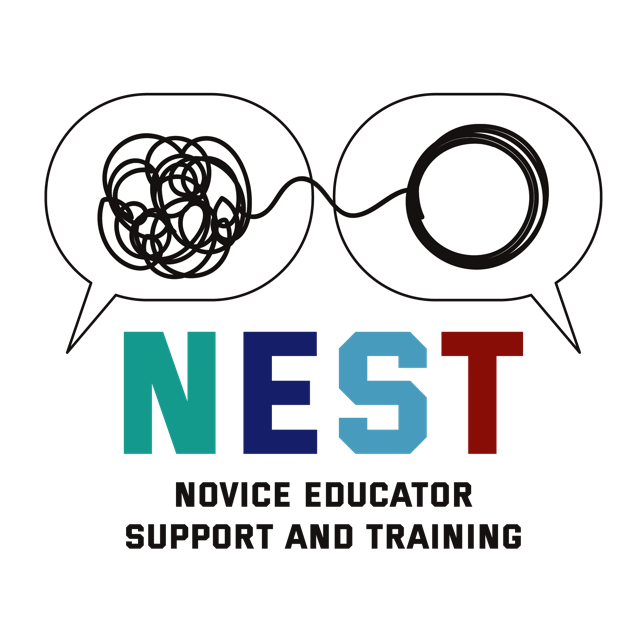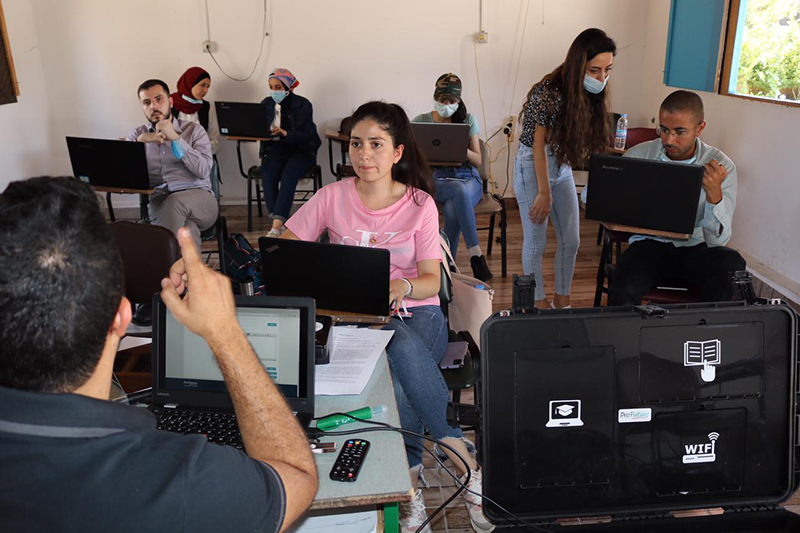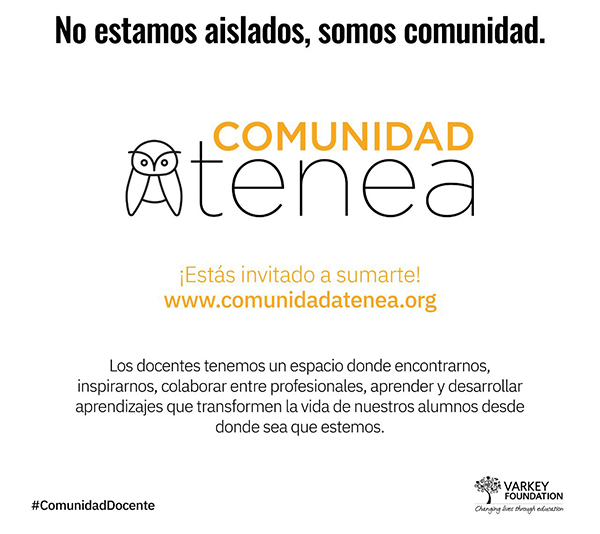Did you know that 62% of teachers in the OECD say that they received no training at all when they started their career in an educational institution? And that only 44% (19% in Spain) are trained with activities based on peer learning and observation? Or that only 22% of new teachers have a tutor or mentor to guide them through their first years of teaching? However, 80% of teachers in these countries consider that the in-service training that has had the greatest influence on their work is that which is based on peer-to-peer collaboration. These are data from the TALIS report, an international survey on teaching and learning which the OECD publishes every five years.
More new teachers in vulnerable schools
Novice teachers, who go from pupil to teacher in a day, are often ill-prepared for the complex challenges of teaching, which are accentuated when teaching in difficult school environments. However, a large proportion of novice teachers have to start their professional careers in difficult and vulnerable school environments. In fact, according to OECD data, vulnerable schools receive more new teachers than those in more socio-economically advantaged environments (23% compared to 19%).
Compared to their peers in other schools, novice teachers working in disadvantaged schools are more likely to change schools or even leave the profession.
Compared to their peers in other schools, novice teachers working in disadvantaged schools are more likely to change schools or even leave the profession. They have the added responsibility of addressing the needs of a larger number of learners who learn in less favourable or even adverse environments, with fewer resources at their disposal and less developed skills for self-directed learning.
The combination of a difficult school environment and lack of experience calls for an adaptive mentoring system that effectively supports and prepares novice teachers on the job and prepares them to meet the needs of their pupils (University Duisburg-Essen, n.d.).

Imagen: Empieza por Educar.
Evidence has shown that mentoring is effective in supporting novice teachers in disadvantaged schools. For example, a meta-analysis carried out by researchers at Harvard University and Brown University in which 60 studies were analysed showed that, if done well, coaching has great positive effects on both teaching practice and the performance of students. More specifically, the quality of the teachers’ teaching improves as much as or more than the difference in effectiveness between a novice teacher and one with five to ten years’ experience (Kraft et al., 2018). Another meta-analysis showed that mentoring positively influences teacher engagement and retention, classroom teaching practices and student achievement (Ingersoll and Strong, 2011).
The NEST Project
Despite their proven benefits, structured induction programmes remain rare and few novice teachers have access to high quality mentoring (European Commission, 2013). Moreover, in order to work, mentors must be adequately trained and use their skills in an adaptive and deliberative way.
In order to remedy this lack of programmes and to study their effects and possibilities, the European Commission has created NEST (Novice Educator Support and Training)a three-year project (2022-2024) to study the impact of mentor training and adaptive mentoring for novice teachers in vulnerable schools in five EU countries (Spain, Belgium, Austria, Bulgaria and Romania).
The aim of the study is to demonstrate that the adaptive mentoring model is a relevant and effective solution to increase the efficiency, motivation and ultimate retention of novice teachers working in disadvantaged schools.
The aim of the study is to demonstrate that the adaptive mentoring model is a relevant and effective solution to increase the efficiency, motivation and ultimate retention of novice teachers working in disadvantaged schools. In addition, the results of the study are intended to provide transnational lessons and offer a roadmap for possible methodologies for improving support to novice teachers. To this end, NEST will design and pilot a model to support novice teachers in disadvantaged schools and evaluate its impact.
Availability, accessibility, acceptability and adaptability
The NEST model is based on the four A’s framework, which defines the basic principles of the right to education set out in 2001 by the United Nations Special Reporter on the Right to Education, Katarina Tomasevski: availability, accessibility, acceptability and adaptability.
- The availability of mentoring includes, for example, the recruitment and qualification of mentors, the professional development and working conditions of mentors.
- In terms of accessibility, the NEST model examines whether novice teachers are regularly mentored and whether mentors have sufficient time to provide mentoring (mentor time per novice teacher and novice teachers per mentor).
- The model also includes the acceptability of the mentoring curriculum and its methods, which should be relevant, culturally appropriate and of good quality.
- Finally, the model focuses on the adaptability of mentoring. In the case of the NEST project, this approach addresses the extent to which mentoring is adapted to the specific professional development needs of teachers teaching in disadvantaged schools. Therefore, the qualification of new mentors in the NEST project will include elements of support aimed at this approach.
How are these four principles put into practice? As explained in Teach for All the organisation in charge of implementing the NEST model, the first step is the creation of a mentor, offering two experienced teachers from the school the possibility of transferring their knowledge and accompanying novice teachers in their first steps. These mentors will be trained by professional educational tutors from the NEST project, who will equip them with the tools, knowledge and techniques necessary to be effective and impactful mentors. Each mentor will train and accompany three novice teachers through their observations and reflections.
In this video (in Spanish), you can see and hear the testimonies of some of the participants of the project in Spain.
Expected benefits of the NEST Project
What are the expected benefits of the NEST Project?
Firstly, the competencies and skills of mentors are expected to increase as a result of the NEST mentor training:
- The mentor acts with an awareness of his or her identity, his or her role as a mentor and his or her vision of success.
- The mentor builds strong and trusting relationships with the mentee.
- The mentor develops his or her own and the mentee’s capacity to reflect and engage in evidence-based reflective dialogue.
- The mentor has a solid understanding of effective pedagogy and the interconnectedness of different aspects of educational practice.
In addition, mentors contribute to the capacity development of novice teachers and to the improvement of their retention in vulnerable schools:
- Improving the motivation and job satisfaction of novice teachers.
- Reinforced guidance to build authentic relationships with learners, while empowering them and encouraging learner engagement.
- The novice teacher develops a strong and supportive classroom culture (learning environment, rules, etc.).
- The novice teacher develops the ability to set vision and goals based on learning objectives and effective planning.
Ultimately, the NEST project is expected to produce results at the systemic and policy level:
- Increasing access to quality mentoring for new teachers.
- Improving teacher retention rates in vulnerable schools.
- Establishing a package of recommendations on adaptive mentoring for policy makers.
Safer mentoring
So far, NEST has trained more than 450 mentors from 39 regions of the European Union, who in turn have mentored some 1,300 teachers. At the halfway point of the programme, some data were presented reflecting the good results that the programme has had on the mentors’ skills during its first year of operation. Thus, most of them agree or strongly agree that the training has equipped them with skills to support novice teachers on their own. They also report feeling more confident in their professional performance, which has also led to greater teacher trust in mentors.
In the next five years, between 40% and 50% of teachers who start teaching today will have left their teaching careers (Ingersoll and Kappan, 2012). This is more likely to happen if these teachers start their careers in vulnerable schools. The evidence seems to indicate that this could be solved with very low resource-intensive mentoring and coaching programmes in terms of time and money. This programme aims to prove it.
REFERENCES
European Commission, /EACEA/Eurydice. (2013). Key Data on Teachers and School Leaders in Europe. 2013 Edition. Eurydice Report. Luxembourg: Publications Office of the European Union.
Ingersoll, R. and M. Strong. (2011). The Impact of Induction and Mentoring Programs for Beginning Teachers: A Critical Review of the Research. Review of Education Research. Vol. 81(2), 201-233.
Ingersoll, R. and P.D. Kappan. (2012). Beginning Teacher Induction: What the Data Tells Us. Education Week. Vol. 93. Issue 8.
Kraft, M.A., Blazar D. and Hogan D. (2018). The Effect of Teacher Coaching on Instruction and Achievement: A Meta-Analysis of the Causal Evidence. Review of Educational Research, 88 (4):547-588.
Teach for All. (2022). Marking the Halfway Point of the NEST Project. At https://teachforall.org/news/marking-halfway-point-nest-project. Viewed on 22 September 2022.
Tomsevski, K. (2001). Economic, social and cultural rights. Annual report of the Special Reporter on the right to education, Katarina Tomasevski, submitted in accordance with Commission on Human Rights resolution 2000/9. United Nations. New York: United Nations.
University of Duisburg-Essen. (n.d.). Novice Educator Support and Training – Mentoring Novice Teachers at Disadvantaged Schools. A Policy Experiment in Seven European Education Systems. At https://www.uni-due.de/edu-research/nest_en.php. Viewed on 23 September 2022.






